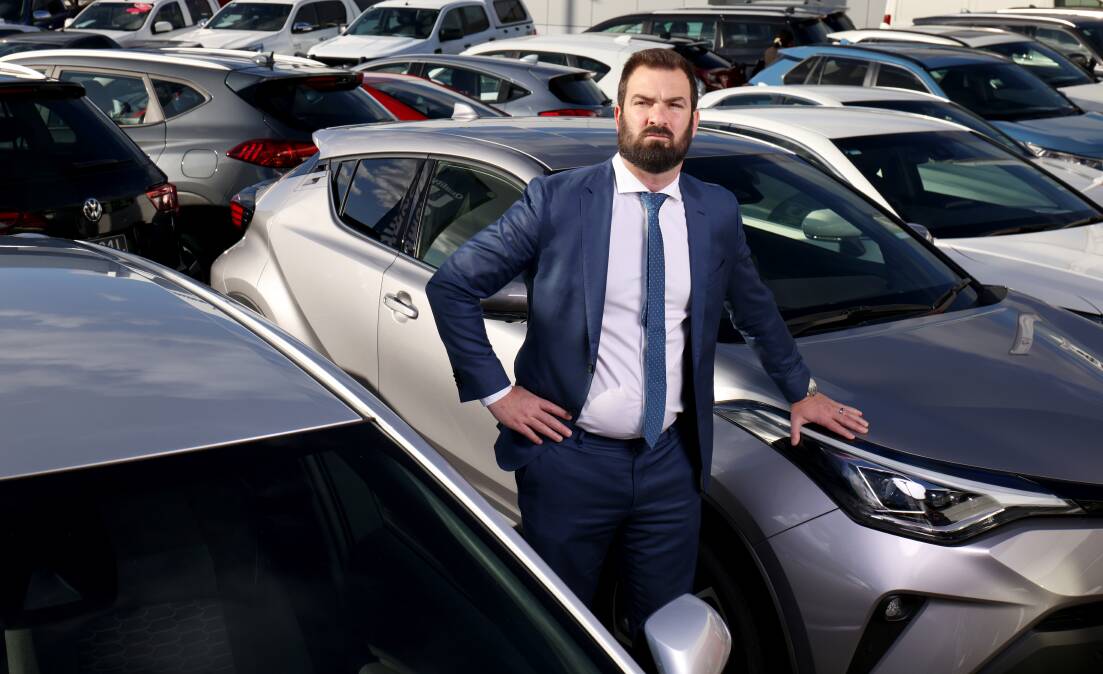
A ban on new light vehicles powered by fossil fuels risks driving up prices in the car market and leaving the ACT without access to popular vehicle types, including utes, industry bodies say.
But the ACT government is confident electric cars will match the cost of a petrol or diesel model, and people will choose the battery-powered option with lower running costs.
Car dealers have already felt pressure in supplying consumers with electric or hybrid cars amid supply chain distributions caused by the COVID-19 pandemic and the war in Ukraine, the Australian Automotive Dealer Association said.
The association's chief executive, James Voortman, said it was unclear whether there would be enough affordable electric vehicles available by the government's internal combustion engine phase-out date in 2035.
"In electric vehicles their batteries demand critical minerals such as lithium and cobalt, and we're not sure if we're going to be able to ramp those up quick enough," Mr Voortman said.
"If the number of vehicles reduces and so do the associated products, we're concerned that this plan will undermine other businesses being able to turn a profit and by extension employ many people."
If new car prices rapidly increased as a result of the ban, motorists would be forced to hold onto their older cars which did little to reduce emissions, he said.
Mr Voortman backed an approach to set tougher carbon dioxide emissions targets for the car industry, which would leave it up to manufacturers to choose which technologies worked to meet the targets.
That approach was also endorsed by the Federal Chamber of Automotive Industries' chief executive, Tony Weber, who warned the ACT was too small to sway the production of electric vehicles if it went out alone on banning internal combustion engines.
Mr Weber said it would be a travesty if the ban meant people hung onto their cars for longer because they could not afford a new electric vehicle, reducing the availability of more affordable second-hand vehicles.
"This lack of consultation with industry drives really bad policies," he said.
Mr Weber said Australia, let alone the ACT, did not have enough demand to force south-east Asian factories to electrify its common models, including many popular utes, meaning the models would become unavailable in the ACT after 2035.
"We can reduce [carbon dioxide] in a very efficient and effective manner while still allowing Australians to drive the vehicles they want to drive," he said in support of industry targets to lower carbon dioxide emissions rather than ban certain technologies.
Long-time Canberra car dealer John McGrath said there was a sense of inevitability there was a complete shift coming towards electric vehicles, whether or not it happened by 2035.
"It's like King Canute holding back the tide. It's going to happen either way. When? I don't know 2035 is the right date, I don't know," Mr McGrath said.
"But I think there would need to be a national approach to this more than an ACT approach."
Mr McGrath, whose yards sell electric cars, said it would be a massive societal change and it was important to start planning now for wider electric vehicle take-up.
Ion DNA managing director Rob Ogilvie, who established an all-electric vehicle showroom in the ACT four years ago, said by 2035 there would be significant advances in battery and electric vehicle technology that would make full fleet electrification achievable.
"I'm very confident. Utes are only a matter of four or five years away in numbers. It's one of those things where you just trust in what's going to happen. I've got no doubt it's all going to work. There's a lot of people with a lot of money pushing for this, to make it happen," Mr Ogilvie said.
The ban will apply to new light vehicles - which include passenger cars, motorcycles and small commercial trucks - and will be backed up by sales targets for electric vehicles.
The ACT government also wants between 80 and 90 per cent of new vehicle sales in 2030 to be zero-emission models.
Energy and Emissions Reduction Minister Shane Rattenbury said setting targets and the fossil fuel phase-out date early gave the community and industry certainty.
"I want to be very clear that the intent is not to take people's cars off the road at 2035 if they're still driving an internal combustion engine, but simply to make sure no new vehicles come into the market. That's the way of really, I guess, driving that transition," Mr Rattenbury said.
The ACT government will this week release a 2022 to 2030 zero-emission vehicles strategy, which will include new programs and incentives to speed the take up of the new technology.
Mr Rattenbury told ABC television on Monday experts believed price parity between electric and petrol cars would be reached in the next three or four years.
"Once you get there there's no reason not to buy an EV: lower running and maintenance costs. People will make the choice," he said.
We've made it a whole lot easier for you to have your say. Our new comment platform requires only one log-in to access articles and to join the discussion on The Canberra Times website. Find out how to register so you can enjoy civil, friendly and engaging discussions. See our moderation policy here.







